- Home
- Kelley Armstrong
The Unquiet past Page 13
The Unquiet past Read online
Page 13
“Only got one seat,” the girl in the front passenger seat said, then added with a giggle, “but I’m sure you kids won’t mind getting cozy.”
“I’ll sit on the floor,” Jackson mumbled to Tess.
The van door swung open to let out a fog of what didn’t smell like cigarette smoke. Tess turned to Jackson and whispered, “Is that marijuana?” He didn’t answer, just kept his face rigid and gave her a nudge that bordered on a shove. Tess climbed in, trying not to cough from the smoke. There were three more people in the backseat, and a single seat at the very rear. The remaining space was crammed with tents and sleeping bags and other gear, but Jackson cleared enough space to hunker down.
“Not going to sit on your boyfriend’s lap?” one of the men in the backseat said.
“He isn’t my boyfriend.”
“Well, he might be, if you sit on his lap.”
The men laughed. The woman up front reached back and smacked the man who’d spoken, telling him to hush, then looked at Tess. “You don’t listen to them. You’re just kids. Friendship is fine. Even if he is cute.” She winked at Jackson, who only stared at a backpack, as if he couldn’t hear her. His jaw was set in that way Tess had come to know meant Don’t bother me. But as the van lurched forward, the smoke swirling around them, she couldn’t help leaning down and whispering, “Is it safe? To drive with…that?”
“No.” He caught her look of horror and his stony expression cracked, as if he’d realized he probably shouldn’t be so blunt. “We’ll be fine. Just keep your seat belt on.”
“You don’t have one.”
He waved off her concern, that mask falling into place again as he withdrew. He stared at the backpack with an unblinking gaze, every muscle stiff, as if braced for the inevitable crash.
Why did we get in if it was dangerous? she wanted to ask, but as soon as she thought that, she knew the answer. Because no one else had stopped.
She didn’t say anything, but she must have given off some kind of vibe, because after a minute he snapped out of it and said gruffly, “We’ll be fine. They’ve come this far.” Which meant, presuming the hippies had been driving like this since Ontario, it wasn’t as if she and Jackson had stepped into a deathmobile. She had noticed that the “cigarette” being passed around didn’t go to the driver, which was a relief.
“You want?” one of the men in the back said, holding out the joint to Tess.
“She doesn’t,” Jackson said curtly.
The woman in the front turned. “I think you should let your friend speak for herself. But I would agree.” She took the joint. “She’s too young.”
When she turned back, Jackson muttered to Tess, “Sorry.”
“I wouldn’t have taken it,” she whispered.
“I know. Just…sorry.” He shifted his position, and it seemed difficult, as if he was holding himself so tight that it hurt to move.
“So, what are you?” asked the man who’d offered Tess the joint, looking at Jackson.
“A student.”
The man rolled his eyes. “Don’t get your back up, kid. I’m not being a jerk. I’m interested.”
“Métis,” Jackson said grudgingly. “French and Cree.”
“Ooh, that’s cool.” The woman turned now. “Isn’t Cree the one where they throw the dead in mass graves and let scavengers eat them?”
Tess swore Jackson cringed, but he just said, “No.”
“Is your tribe near here?” another asked.
“I don’t have a tribe. I’m Métis. It’s a separate—”
“Do you live on a reservation? We were saying just the other day that we’d like to visit one, maybe check out the powwows.”
“Yeah,” the woman said. “That’d be cool. At one with nature. That’s what we want. Respecting Mother Earth and—”
“I don’t live on a reservation. I’m Métis. I live in the city. In the suburbs, actually, in a regular house, with my regular parents, who have regular jobs. I’ve never even been to a powwow.”
“Bummer.” The man who’d tried to pass the joint leaned forward. “But you could hook us up, couldn’t you? With a tribe? We’d like to try those peyote shaman ceremonies—”
“Peyote is a cactus,” Jackson said. “From Mexico. We aren’t in Mexico. The Cree aren’t from Mexico. I can’t hook you up with anything or anyone. If you want to learn the culture, start with books.”
“Nah,” the man said. “That’s for squares. We’re all about experiencing. Life and cultures and diversity and…” He waved the joint and grinned. “Experiencing, you know?” He swiveled in his seat and held the joint out to Tess, leaning over so far he planted a hand on her knee. “You sure you don’t want to try some, honey?”
Jackson plucked the man’s hand from her leg. “She’s sixteen. How old are you? Thirty?”
“Twenty-four, spaz. And sixteen is plenty old enough—”
“The boy’s right, Ross,” the woman said. “Even if he is a little touchy.” She looked at Jackson. “We’re not making fun of you. We’re just trying to learn more about your culture.”
Jackson seemed to struggle for a reply before saying evenly, “All right. If you really are interested, there’s the McCord Museum in Montreal. It will give you information on Native and Métis cultures, and you can take it from there.”
“You shouldn’t get so defensive,” the woman said. “People are just interested.”
Now he seemed to struggle against a reply, settling for a brisk, wordless nod.
“Where are you all from?” Tess asked. “If it’s all right to ask?”
It was, and the woman answered, diverting attention from Jackson. He eased back, not relaxing but withdrawing into his thoughts for the rest of the short ride.
Twenty-Two
“YOU THINK I was rude,” Jackson said as they sat on the bench, waiting for the bus.
“Hmm?” Tess had been lost in thoughts of her own—namely, that she needed to call Billy for a check-in and buy postcards in Montreal.
“With those hippies. You think the woman was right. That I was getting defensive.”
“I think you can be defensive,” she said. “But not in the van. Yes, they weren’t intentionally insulting you. They thought they were being respectful. They were just ignorant…and maybe kind of insulting. It’s like when people in our town found out I grew up in the orphanage. They acted like I was Little Orphan Annie and made all these weird assumptions about how I lived. I’d tell them it was like boarding school, except I didn’t go home for the holidays. They never believed me. They were sure I was scrubbing floors all day and sleeping in a lice-infested room with twenty other girls.”
He nodded slowly. “You’re right. It’s like that, and I didn’t mean to…” He trailed off and rubbed a hand over his face. “I was upset about the pot and about us not getting a better ride and knowing it was my fault, that if you’d been alone, you wouldn’t have had to go through that.”
“No, I just get picked up by random perverts.”
A wan smile. “True. And honestly, I’d be lying if I said I wouldn’t have acted that way otherwise. My parents taught me to be more polite. To accept that most people don’t mean to be insulting, and to use that as a teaching opportunity. To gently relieve them of their misconceptions. It’s just…it really bothers me, and unless I’m in a good mood, I get snippy.”
“I don’t blame you.” She watched a couple of cars pass, then said, “Does that happen a lot? I guess it must, living in the suburbs and going to a private school.” She realized how that sounded and hurried on. “I don’t mean that Métis kids don’t normally do that, just that they’re a minority, and any minority—”
“You don’t need to explain, Tess. I’m not going to jump down your throat.” He raked his hair back. “And I guess I have jumped down your throat a few times, so I can’t blame you. But you’re right. It wouldn’t matter what kind of minority you are, suburbs and private schools are mostly white kids. I’ve lived in the same neighborh
ood all my life. Went to the same school all my life. If anything, I’m sheltered there. Then I get out in the real world, and it’s like with the boulanger—I don’t know if he’s being a jerk because I’m a teenage boy or a stranger or Métis. I’ve gotten more sensitive in the last year because…” He shrugged and went quiet.
Tess thought that was the end of the conversation, but then he cleared his throat and said, “I need to tell you something before we get to Montreal.”
“All right.”
“Earlier, I was getting on your case about being honest, and this is going to sound like something I should have mentioned sooner, but we were caught up in the journal, and I figured I’d tell you on the way and then…”
“You got caught up in the journal again.”
“Yeah. Well, remember you asked about school? Whether I graduated?”
She nodded.
“I did. A year ago. I’m heading into my second year at McGill.”
“Oh.”
He shifted on the bench. “I wasn’t being dishonest, but I wasn’t rushing to tell you the truth either.”
“You said you’re almost eighteen. When’s your birthday?”
“December.”
She gave him a look. “It’s June now. When I say I’m almost seventeen, I mean my birthday is next month. You’re only six months older than me.”
“Seven.”
Another hard look. He sighed and shifted again. “All right. I didn’t lie, but I may have misrepresented the truth. I skipped a year. I don’t go around announcing it. People act weird when they know you’re smart.”
“I think as soon as you open your mouth people know you’re smart.”
More fidgeting. “Anyway, my point was that if I’m sensitive about the minority thing, it’s been…different this year. Being at university. Out of my usual environment.” He rubbed a hand over his face. “I’m blathering. Sorry. Kind of tired. I’ll stop talking now.”
“I like it when you talk.”
As soon as she said the words, her cheeks flamed red hot. She struggled for a way to fix it, to keep him from pulling back, withdrawing. But he gave her that wry smile again and said, “I think you’re the first person who’s ever said that.”
“You have interesting things to say.”
A sheepish nod. “Thanks.”
“About McGill,” she hurried on, feeling an awkward silence threatening. “What’s it like? Being in university?”
He relaxed at that, and they talked about school until the bus came and continued talking as they boarded.
Back to Montreal. Her first time through, Tess had felt overwhelmed—by the visions, the journey, the city—and it had been like ducking her head to run through a thunderstorm. She’d noticed little of her surroundings. Now, having made progress and feeling confident, with someone at her side to help her through the rough patches, she was in the mood to enjoy all the city had to offer. Unfortunately, Jackson wasn’t.
They’d spent most of the bus trip chatting, and now he seemed talked out, in no mood to play tourist, let alone tour guide. She didn’t even get to enjoy the sights from the window of an electric bus. At the bus station, he insisted on paying for a cab and directed the driver to take them straight to McGill.
At least the university was pretty. The campus was downtown, with exactly the sort of sprawling old buildings Tess had imagined a university should have. Green lawns rolled out in front like welcome mats. Summer students played Frisbee and read under massive old trees. Mount Royal—the mountain the city took its name from—loomed behind the campus.
Tess’s feelings about university had always been mixed. She’d seen the allure of a higher education, but the allure of the greater world had pulled harder. Now, seeing the campus and the students, for perhaps the first time in her life she could imagine herself there. That set her stomach twisting a little. She’d always known exactly what she wanted: to get away from Hope, to explore and travel. Only two days out, though, and the world seemed to have shifted on its axis, throwing her off balance. There were choices. So many choices. Perhaps she’d been so intent on escape that she hadn’t really considered them. It was an unsettling thought for a girl who prided herself on knowing what she wanted from life.
“What are we doing first?” Tess asked as the taxi dodged through traffic.
“Getting a room.”
The driver understood enough English to look sharply at them through the rearview mirror.
“Getting separate dorm rooms for the night,” Jackson clarified. “There are ones we can rent for a few days.”
“It’s only four o’clock,” she said, then quickly added, “You’re tired.”
He made a noise in his throat that bordered on agreement. “It’s summer term too. By the time we get settled, it’ll be too late to find anyone in the psychology or psychiatry department. Also, the library closes soon.”
“That’s it then? We’re in for the night?”
He nodded, then added a conciliatory, “We’ll get an early start in the morning.”
Tess tried not to show her disappointment. Everything he said might have been true, but she couldn’t help feeling he was simply done for the day. Done talking. Done being companionable. Done with her. Which stung, but she could hardly blame him, given that he’d been woken last night by her screams and gotten little rest since. If she was being honest, she was exhausted too. The dorm promised a shower and hot food, and she was close enough to downtown to buy postcards and call Billy. A full evening.
“I’ll keep reading the journal,” he said. “I’ll tell you what I find over breakfast.”
Twenty-Three
ONCE WITHIN THE walls of McGill, she heard almost exclusively English, which seemed odd to her ear now, and while it made communication easier, she found herself wishing for the opportunity to exercise her French.
She was in a dorm just for girls. She had no idea if they were all divided that way, but that’s where Jackson had put her. Once he had left, she’d called Billy and talked for as long as her change lasted. She’d told him about the house and the journal and that she was at McGill, following up. He was, perhaps, the one person who could hear that and say, “Cool,” not “Are you nuts? You can’t investigate by yourself.”
Of course, she wasn’t doing it by herself, but that was the part she excised from her account. The truth would sound ridiculous—that she’d met a backpacking student camping out in an abandoned house, hired him and they were now at McGill, solving her mystery together. Billy would react in the same way Jackson had to Steve. Did she really think Jackson was helping her out of the goodness of his heart? Well, no. The idea made her laugh. He was helping because this mystery promised far more excitement than hitchhiking through the Quebec countryside. But to understand that, you needed to know Jackson, and Billy did not.
Having bought postcards nearby, along with snacks and a notebook, she spent most of the evening writing to her friends. One distinct advantage of the postcard form: there wasn’t room for more than a few lines, meaning no one would expect details of her adventure. A simple: Salut de Montreal! Still hard at work, unraveling the mystery of my past while improving my deplorable French (remember how Mlle. Béringer said we’d be all set for Paris? We aren’t!) Hope you are making progress of your own. Miss you! XOXO Tess
She then found a mini-library in the dorm common room, where guests had left behind books for others. She took The Collector, which she’d seen on a new-release shelf in the train station. She got about fifty pages in before realizing it was, quite possibly, the worst book she could have picked to read at the moment. It was the story of a girl “collected” by a predator, who locked her in a room like his precious butterflies. She put it aside quickly but still spent the night surfing through dreams where Steve took her captive and trapped her in one of the mansion’s closets.
Despite her nightmares, she awoke feeling refreshed. Or perhaps simply relieved that the night was over. At just past seven, she was bound
ing down the front steps, showered and dressed in her boots, scarf and a miniskirt she’d found among the clothes Billy gave her. She even had a newly purchased notebook under her arm and a fountain pen in her pocket, and she felt like an actual university student. When she came down the steps, a boy going up swiveled to watch her, and she grinned at him.
“Thérèse.”
Jackson sat on the balustrade that enclosed the front porch. He checked his watch as she walked over.
“You said seven thirty at the cafeteria, didn’t you?”
He grunted and eyed her as she swung over to him.
“You’re chipper this morning.” His tone suggested he took this as a personal affront.
“And you are not. You didn’t stay up all right reading that journal, I hope.”
Another grunt.
“You look as if you did,” she said. “At least you seem to have showered, though, which is an improvement.”
She grinned as she said it. Teasing him, and perhaps, yes, needling him a little, which she’d learned was more likely to shake his ill temper than solicitude.
“Yeah, yeah,” he muttered. “Are you going to be able to sit still through breakfast?”
“Of course. I may skip all the way there though. That won’t embarrass you, will it?”
“We’re not going to the caf.” He lifted a bag from his side. A bakery bag, the smell of fresh bread wafting out. “The library opens at eight, and I want to be there when it does.”
“Yes, sir.”
They crossed the lawn and found a place not yet shaded, the morning cool and the sun warm.
“I finished the journal,” he said as they started eating. “I made notes.”
He passed her a sheaf of papers. At least ten of them, in single-spaced, perfect handwriting.
“You were up all night,” she said. “You shouldn’t have—”
“I was in bed before midnight. Now, about the journal. I’ve determined they were doing sensory-deprivation experiments.”

 The Calling
The Calling Darkest Powers Bonus Pack
Darkest Powers Bonus Pack Betrayals
Betrayals Sea of Shadows
Sea of Shadows Rough Justice
Rough Justice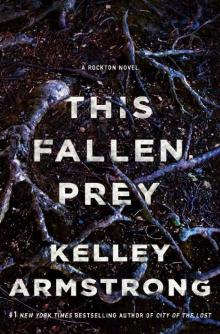 This Fallen Prey
This Fallen Prey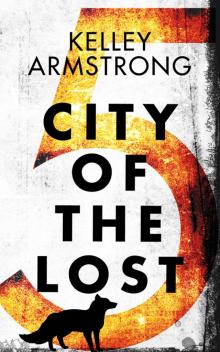 City of the Lost: Part Five
City of the Lost: Part Five Perfect Victim
Perfect Victim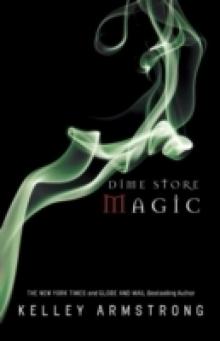 Dime Store Magic
Dime Store Magic Personal Demon
Personal Demon Haunted
Haunted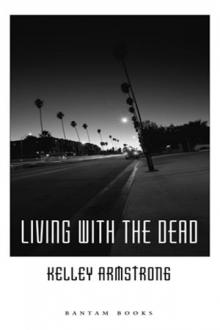 Living With the Dead
Living With the Dead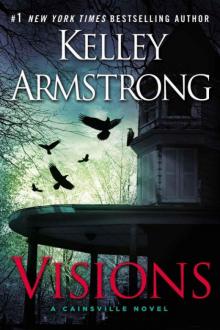 Visions
Visions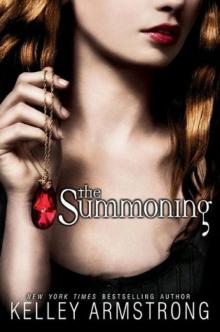 The Summoning
The Summoning Broken
Broken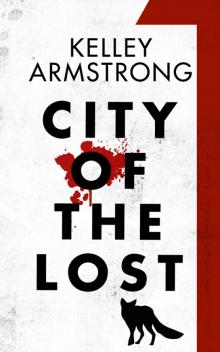 City of the Lost: Part One
City of the Lost: Part One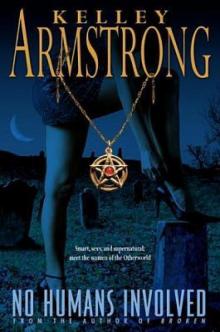 No Humans Involved
No Humans Involved The Awakening
The Awakening The Reckoning
The Reckoning The Gathering
The Gathering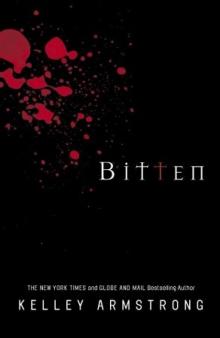 Bitten
Bitten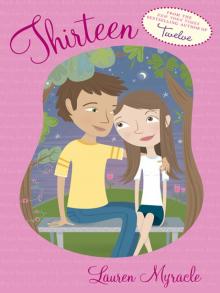 Thirteen
Thirteen Gifted
Gifted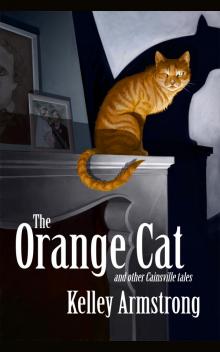 The Orange Cat and Other Cainsville Tales
The Orange Cat and Other Cainsville Tales Darkest Powers Bonus Pack 2
Darkest Powers Bonus Pack 2 Rituals
Rituals Waking the Witch
Waking the Witch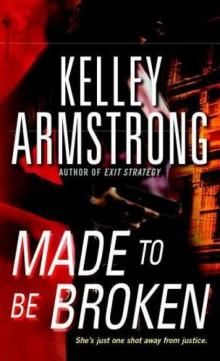 Made to Be Broken
Made to Be Broken Lost Souls
Lost Souls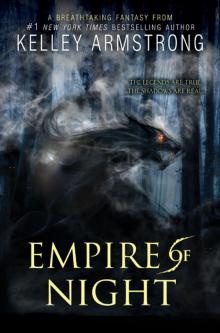 Empire of Night
Empire of Night Wild Justice
Wild Justice Double Play
Double Play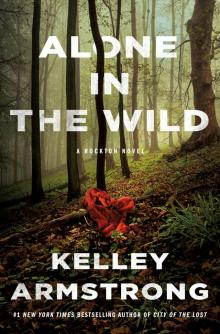 Alone in the Wild
Alone in the Wild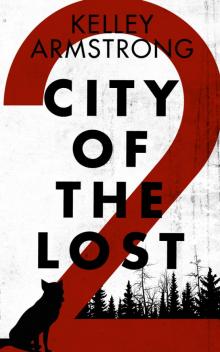 City of the Lost: Part Two
City of the Lost: Part Two A Stranger in Town
A Stranger in Town Watcher in the Woods: A Rockton Novel
Watcher in the Woods: A Rockton Novel Atoning
Atoning Spellbound
Spellbound Wolf's Bane
Wolf's Bane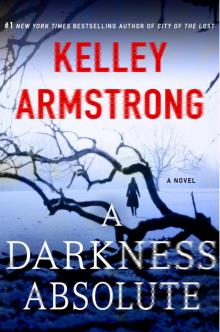 A Darkness Absolute
A Darkness Absolute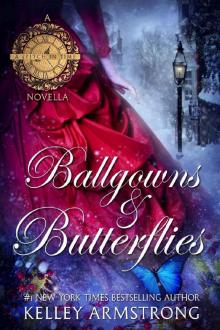 Ballgowns & Butterflies: A Stitch in Time Holiday Novella
Ballgowns & Butterflies: A Stitch in Time Holiday Novella Wherever She Goes
Wherever She Goes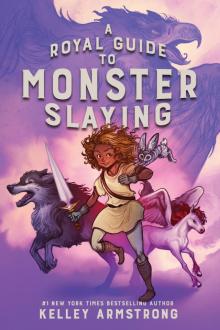 A Royal Guide to Monster Slaying
A Royal Guide to Monster Slaying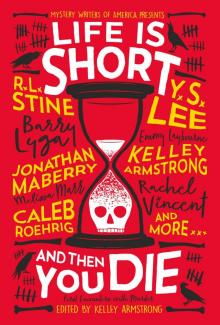 Life Is Short and Then You Die
Life Is Short and Then You Die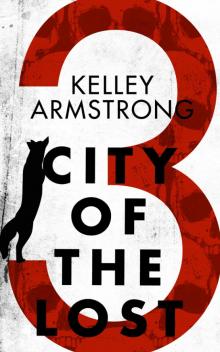 City of the Lost: Part Three
City of the Lost: Part Three Frostbitten
Frostbitten A Stitch in Time
A Stitch in Time Industrial Magic
Industrial Magic Wherever She Goes (ARC)
Wherever She Goes (ARC) Snowstorms & Sleigh Bells: A Stitch in Time holiday novella
Snowstorms & Sleigh Bells: A Stitch in Time holiday novella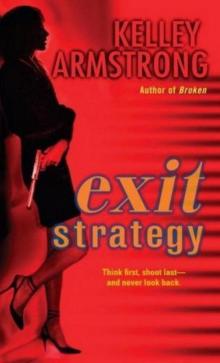 Exit Strategy
Exit Strategy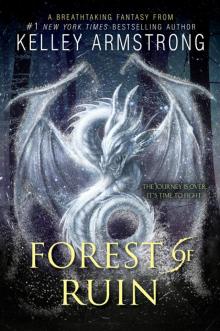 Forest of Ruin
Forest of Ruin Cursed Luck, Book 1
Cursed Luck, Book 1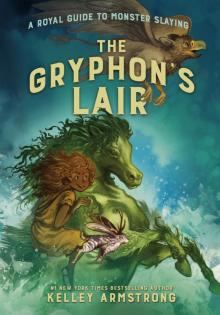 The Gryphon's Lair
The Gryphon's Lair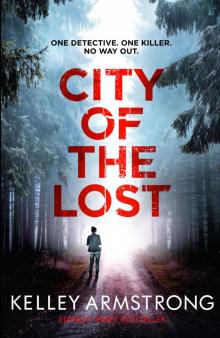 City of the Lost
City of the Lost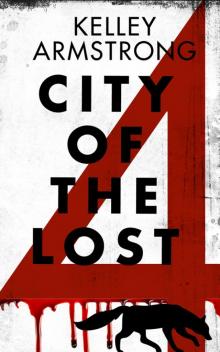 City of the Lost: Part Four
City of the Lost: Part Four Deceptions
Deceptions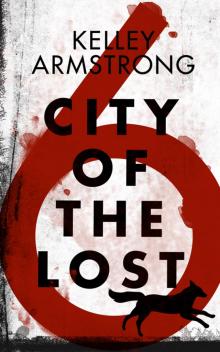 City of the Lost: Part Six
City of the Lost: Part Six Urban Enemies
Urban Enemies Stolen
Stolen Every Step She Takes
Every Step She Takes Portents
Portents Wolf's Curse
Wolf's Curse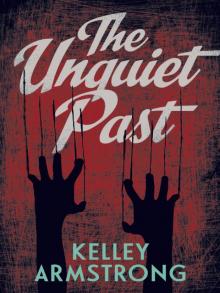 The Unquiet past
The Unquiet past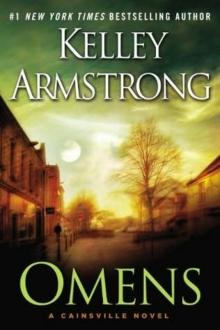 Omens ct-1
Omens ct-1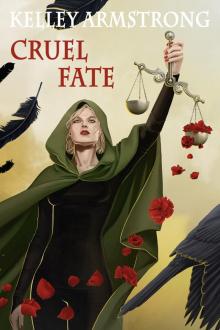 Cruel Fate
Cruel Fate The Calling dr-2
The Calling dr-2 The Awakening dp-2
The Awakening dp-2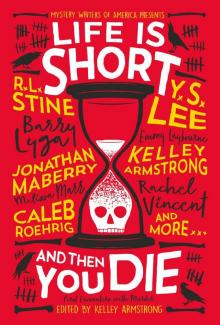 Life Is Short and Then You Die_First Encounters With Murder From Mystery Writers of America
Life Is Short and Then You Die_First Encounters With Murder From Mystery Writers of America Goddess of Summer Love: a Cursed Luck novella
Goddess of Summer Love: a Cursed Luck novella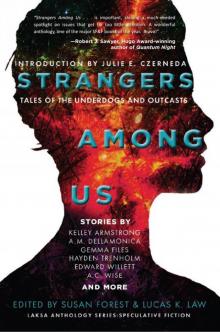 Strangers Among Us
Strangers Among Us The Gathering dr-1
The Gathering dr-1 The Rising dr-3
The Rising dr-3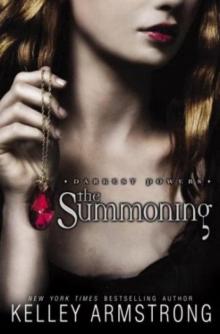 The Summoning dp-1
The Summoning dp-1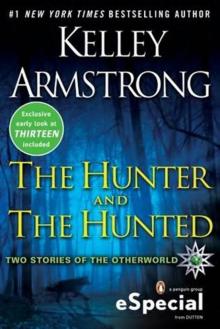 The Hunter And The Hunted
The Hunter And The Hunted Waking the Witch woto-11
Waking the Witch woto-11